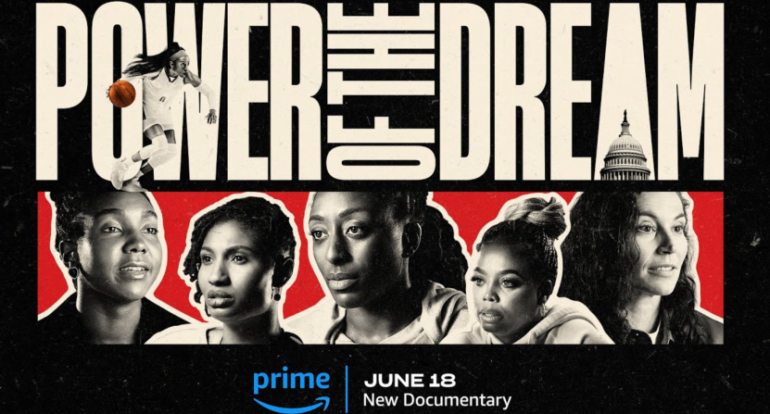For years, the WNBA has been in a league of its own when it comes to advocating for and speaking out against social justice issues. The league is filled with players who are just as passionate about speaking up on injustices off the court as they are of the product on the court.
Since the league’s inception, activism has been ingrained into its fabric, and it is evident in the new Prime Video documentary “Power of the Dream“, directed by Dawn Porter. The film was released on June 18 after premiering at the Tribeca Film Festival.
Activism and Advocacy: A Makeup of the WNBA

The film’s origins trace back to 2020 at the height of the Covid-19 pandemic and the Black Lives Matter movement, amid the social unrest in the country. The then Dream co-owner and Senator Kelly Loeffler publicly reprimanded the WNBA for publicly supporting the Black Lives Matter movement, saying “no more politics in sports.”
Instead of voicing their anger towards Loeffler, the players instead took a stand by backing and supporting now-Georgian Senator Raphael Warnock to beat her in the Georgia Senate run-off race.
The documentary centers around the experience and the decisions that players including Nneka Ogwumike, former Los Angeles Spark’ and current President of the WNBA Players Association, Sue Bird of the Seattle Storm, Layshia Clarendon and Elizabeth Williams, then of the Atlanta Dream, and Angel McCoughtry of the Las Vegas Aces during the 2020 “Wubble” season in Florida. The documentary also features insights from prominent media voices including Holly Rowe and Jemele Hill.
Decisions and Dedications During the 2020 Season
During the 2020 WNBA season, when other professional sports leagues were being canceled or forced into a bubble, the players had to make a decision whether to play amid the pandemic and the unjust killings of Black people by police. The WNBA season was held at the IMG Academy in Bradenton, Florida, and the league dedicated its season to the “Say Her Name” campaign and Breonna Taylor. There were difficult discussions with the new CBA agreement and the players wanting to get paid their full salaries, with some of them choosing to sit out the season to focus on social justice initiatives.
During that season, the documentary shows behind-the-scenes footage of players like Bird, Clarendon, Williams and Ogwumike organizing the entire league of 144 into the “Wubble,” navigating the difficult decisions of whether to play each night when so much else was going on in the country, as well as the league-wide decision to back Warnock by wearing endorsement t-shirts and organizing statements. The players wholeheartedly stood behind and supported Warnock and were incredibly influential in his polling numbers and eventually beating the incumbent Loeffler and flipping Georgia from red to blue.
There were some powerful scenes in the film reflecting on such a tumultuous and difficult time in 2020. Rewatching these scenes of players locking arms, kneeling and raising their fists during the national anthem, wearing shirts spelling out the name of Jacob Blake with bullet holes drawn on the back and holding a vigil in their bubble in Florida was incredibly moving. It really does show that when a group of people feel passionate about something, change is possible.
A Powerful Portrayal of the League
While the film focuses on the specific experience in 2020, it also serves as a broader look at how activism has been ingrained in the league. Journalist Jemele Hill said in the documentary that “the activism that you see in the WNBA inherently started the moment the first WNBA game was played.” Especially in a league that is primarily Black women, many of them part of the LGBTQ+ community, there isn’t an option to separate politics and sports because of the current social landscape, with many of their livelihoods constantly being threatened.
Even in 2016, players were at a crossroads between speaking out about what was important for them and running the risk of being fined. Players who didn’t even get paid a fifth of what NBA players were making put their salaries, their jobs and even their lives on the line to speak out about what was important to them. Many were getting death threats for not coming out of the tunnel for the national anthem or wearing shirts calling for change.
These players risked their bodies every day on the court and they also risked their jobs and livelihood in the pursuit of justice and what was important to them. As Bird said in the documentary, “As female athletes, [we’re] judged based on everything except the game we’re playing. It’s never just been about basketball.”
Bigger than Basketball
Even though the documentary centers around the 2020 season in particular, it serves as a larger story of the almost three decades of activism for the WNBA. It features great athlete-activists in Ogwumike and Bird, in addition to other important voices like Clarendon, Williams and McCoughtry. WNBA players have been putting their careers on the line long before it was even publicized, showing that the players cared more about standing up for what they believed in over doing it for clicks and views.
Athletes really do have a voice and power. While some people may just prefer they “shut up and dribble,” the players of the WNBA in particular have long proven this statement wrong.
When I started following the WNBA right around 2016, and the New York Liberty in particular, I was drawn to the league because of how the players spoke out about issues that mattered to them, which wasn’t often very noticeable in any other professional leagues. The documentary manages to capture this empowerment and moment in a timely and timeless way.


